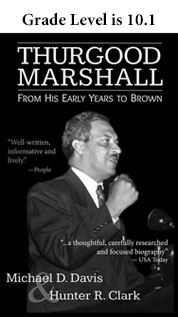Thurgood Marshall: From His Early Years to Brown by Michael D. Davis and Hunter R. Clark
Download in epub format:
Download in mobi format for Amazon devices:
Editorial reviews:
“Michael Davis and Hunter Clark have crafted a thoughtful, carefully researched and focused biography.” —USA Today
“Well-written, informative and lively.” —People
“Michael D. Davis and Hunter R. Clark offer a masterfully written tale of an American legend.” — Gannett News Service
“Filled with the same fire, passion and humor that drove Marshall’s life, Thurgood Marshall is a revealing portrait of a pioneering lawyer.” —National Black Review
This ebook edition is the first half of the 1992 print edition of “Thurgood Marshall: Warrior at the Bar, Rebel on the Bench.” This new edition covers Thurgood Marshall’s youth, education, and the legal strategies he used, and the cases he argued leading up to the Brown v. Board of Education decision. The reviews above are from the print edition.
Publisher’s Note:
Chapter 1 describes Thurgood Marshall’s place in history.
Chapter 2 explains the challenges Marshall and the attorneys of the N.A.A.C.P were to face as they built the precedents that led to the Brown decision.
Chapter 3 is about Marshall’s childhood in Jim Crow Baltimore, and is probably the best starting point for high school students who want to begin with a straight-forward story of the life of a courageous leader. This chapter lends itself to writing assignments such as “Compare your public school years to what Thurgood Marshall experienced in Baltimore.” Not only will students have to read the chapter to complete the writing assignment, but there will be space for their own voices in the assignment. They may find this comparison more interesting than a book report.
Chapter 4 describes his years in Howard University Law School, and the work of his mentor, Charles Hamilton Houston, who saw how the law school and its graduates could fight racial injustice.
Subsequent chapters describe the work Marshall did on the cases leading up to the Brown decision, his civil rights work in the South, and his push for fair treatment of Black G.I.s during the Korean War.

